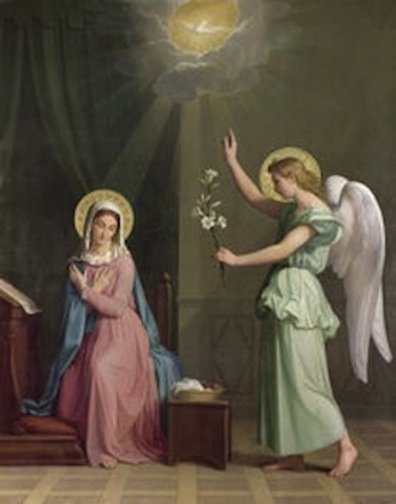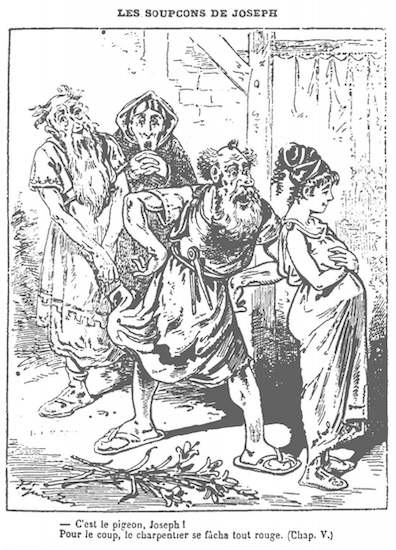Mulligan's poem in Telemachus strives to offend
Catholic sensibilities twice in one line: "My mother's a
jew, my father's a bird." Christians have long thought
of Jesus and his blessed mother as something other than Jews,
and when they put doves in Annunciation scenes they do not
think of the Holy Spirit literally as a randy bird. The second
joke returns in Proteus, with the dove demoted to a
mere "pigeon," when Stephen recalls a work called "La
Vie de Jésus by M. Léo Taxil."
In Nestor Mr. Deasy repeats the old canard that by
killing Jesus the Jews "sinned
against the light," ignoring the fact that Jesus was
himself a Jew. In Eumaeus Bloom recalls how he
enraged the Citizen by saying "your God was a jew," reflecting
that "mostly they appeared to imagine he came from
Carrick-on-Shannon or somewhere about in the county Sligo."
In the context of such ethnocentrism, Mulligan's "My
mother's a jew," while factually
unremarkable, is effectively insulting.
Saying "my father's a bird" goes
further into the realm of blasphemy, by reading a traditional
symbol of the Holy Spirit literally and imagining avian-human
intercourse. The gospel of Luke recounts the angel
Gabriel's visit to Mary in what became known as The
Annunciation. The angel says that the Holy Spirit "will come
upon you" (!), and that Mary will become pregnant with the Son
of God. In later pictorial representations, the Holy Spirit
often took the form of a dove. So, in Mulligan's mind, a
testosterone-maddened pigeon came upon Mary and inseminated
her.
Mulligan's image fills Stephen's imagination as he walks
toward the Pigeonhouse in
Proteus. He recalls a very brief exchange from a
ponderously long (389 pp.) work titled La vie de Jésus,
published in 1884. In that work, writing under the pen name
Léo Taxil, Gabriel Jogand-Pages tells how Mary's cuckolded
husband, Joseph, demands, "Qui vous a mis dans
cette fichue position?" ("Who has put you in
this rotten position?"). Mary's orthodox account of the
paternity is marred by a choice of words very similar to
Mulligan's "bird": "C'est le pigeon, Joseph"
("It was the pigeon, Joseph"). This blasphemy enraged the
Vatican, and Jogand-Pages was forced to apologize to the papal
nuncio and travel to Rome for what Gifford calls "a
well-publicized papal absolution" (53).
In Oxen of the Sun, Stephen is still thinking of
the passage: "parceque M. Léo Taxil nous a dit que
qui l'avait mise dans cette fichue position c'était le
sacré pigeon" ("because M. Leo Taxil tells
us that it was the blasted pigeon that put her in this rotten
position"). In a personal communication, Ole Bønnerup tells me
that when placed before a noun, rather than after it, the
adjective sacré changes its meaning from "sacred" or
"blessed" to something like "bloody" or "goddamn," so Stephen
is adding his own linguistic irreverence to Taxil's.
The thought that a pigeon sired Jesus sends Stephen's mind on
to a young man he knew in Paris named Patrice Egan. It was
Patrice who recommended La vie de Jésus to Stephen.
But Patrice has more than an incidental connection to the
conceit. Since his father Kevin Egan is a "wild goose," he too
can truthfully say, "My father's a bird." As
in Stephen's conceit about
algebra, where morris dances and Moorish turbans combine
with the Moorish art of mathematics, the pieces interlock
wonderfully.


